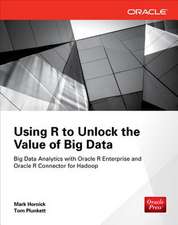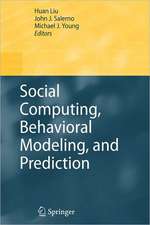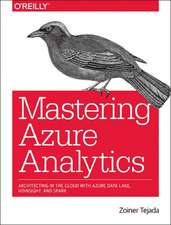Social Computing and Behavioral Modeling
Editat de Huan Liu, John Salerno, Michael J. Youngen Limba Engleză Hardback – 26 mar 2009
| Toate formatele și edițiile | Preț | Express |
|---|---|---|
| Paperback (1) | 875.72 lei 38-44 zile | |
| Springer Us – 5 noi 2010 | 875.72 lei 38-44 zile | |
| Hardback (1) | 990.80 lei 3-5 săpt. | |
| Springer Us – 26 mar 2009 | 990.80 lei 3-5 săpt. |
Preț: 990.80 lei
Preț vechi: 1238.51 lei
-20% Nou
Puncte Express: 1486
Preț estimativ în valută:
189.58€ • 198.48$ • 156.87£
189.58€ • 198.48$ • 156.87£
Carte disponibilă
Livrare economică 15-29 martie
Preluare comenzi: 021 569.72.76
Specificații
ISBN-13: 9781441900555
ISBN-10: 1441900551
Pagini: 264
Ilustrații: XVI, 264 p. 100 illus.
Dimensiuni: 155 x 235 x 18 mm
Greutate: 0.52 kg
Ediția:2009
Editura: Springer Us
Colecția Springer
Locul publicării:New York, NY, United States
ISBN-10: 1441900551
Pagini: 264
Ilustrații: XVI, 264 p. 100 illus.
Dimensiuni: 155 x 235 x 18 mm
Greutate: 0.52 kg
Ediția:2009
Editura: Springer Us
Colecția Springer
Locul publicării:New York, NY, United States
Public țintă
ResearchCuprins
Reality Mining of Mobile Communications: Toward A New Deal On Data.- Lifting Elephants: Twitter and Blogging in Global Perspective.- Rule Evaluation Model as Behavioral Modeling of Domain Experts.- Trust and Privacy in Distributed Work Groups.- Cultural Consensus Theory: Aggregating Expert Judgments about Ties in a Social Network.- Dynamic Networks: Rapid Assessment of Changing Scenarios.- Modeling Populations of Interest in Order to Simulate Cultural Response to Influence Activities.- The Use of Agent-based Modeling in Projecting Risk Factors into the Future.- Development of an Integrated Sociological Modeling Framework (ISMF) to Model Social Systems.- The Coherence Model of Preference and Belief Formation.- Cognitive Modeling of Household Economic Behaviors during Extreme Events.- Collaborating with Multiple Distributed Perspectives and Memories.- When is social computation better than the sum of its parts?.- The Dilemma of Social Order in Iraq.- A Socio-Technical Approach to Understanding Perceptions of Trustworthiness in Virtual Organizations.- Prior-free cost sharing design: group strategyproofness and the worst absolute loss.- Monitoring Web Resources Discovery by Reusing Classification Knowledge.- Finding Influential Nodes in a Social Network from Information Diffusion Data.- Meta-modeling the Cultural Behavior Using Timed Influence Nets.- A Validation Process for Predicting Stratagemical Behavior Patterns of Powerful Leaders in Conflict.- Control of Opinions in an Ideologically Homogeneous Population.- Estimating Cyclic and Geospatial Effects of Alcohol Usage in a Social Network Directed Graph Model.- HBML: A Language for Quantitative Behavioral Modeling in the Human Terrain.- VIM: A Platform for Violent Intent Modeling.- Punishment, Rational Expectations, and Relative Payoffs in a Networked Prisoners Dilemma.- A Network-Based Approach to Understanding and Predicting Diseases.- Status and Ethnicity in Vietnam: Evidence from Experimental Games.- Behavior Grouping based on Trajectory Mining.- Learning to Recommend Tags for On-line Photos.- A Social Network Model of Alcohol Behaviors.- Using Participatory Learning to Model Human Behavior.
Textul de pe ultima copertă
Social computing concerns the study of social behavior and context based on computational systems. Behavioral modeling reproduces the social behavior, and allows for experimenting, scenario planning, and deep understanding of behavior, patterns, and potential outcomes. The pervasive use of computer and Internet technologies creates an unprecedented environment where people can share opinions and experiences, exchange ideas, offer suggestions and advice, debate and even conduct experiments. Social computing facilitates behavioral modeling in model building, analysis, pattern mining, anticipation, and prediction.
This volume presents material from the second interdisciplinary workshop focused on employing social computing for behavioral modeling and prediction. The book provides a platform for disseminating results and developing new concepts and methodologies aimed at advancing and deepening our understanding of social and behavioral computing to aid critical decision making. The contributions from this year’s conference, incorporating views from government, industry and academia, address themes such as:
This volume presents material from the second interdisciplinary workshop focused on employing social computing for behavioral modeling and prediction. The book provides a platform for disseminating results and developing new concepts and methodologies aimed at advancing and deepening our understanding of social and behavioral computing to aid critical decision making. The contributions from this year’s conference, incorporating views from government, industry and academia, address themes such as:
- social network analysis
- modeling
- machine learning and data mining
- social behaviors and social order
- public health
- cultural aspects
- trust, privacy, and intention
- opinion, preference, influence, and diffusion
- extreme events
- assessment and validation
- effects and search
Caracteristici
Integrates an interdisciplinary audience comprised of researchers, practitioners, and graduate students from social science, behavioral science, computer science, psychology, cultural study, information systems, and operations research Incorporates views from government, industry, and academia



























